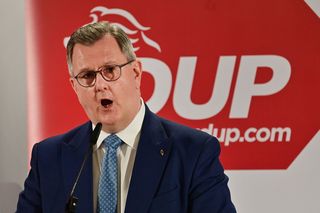EU's Apple tax ruling is 'political', says Noonan
Michael Noonan said "politics" was a factor in the European Commission's ruling that Ireland gave Apple a sweetheart tax deal. Photo: PA
Finance Minister Michael Noonan has accused Brussels of being politically motivated when it found against Ireland's tax system in a landmark case last year.
"Politics" was a factor in the European Commission's ruling that Ireland gave Apple a sweetheart tax deal, he told the Oireachtas Finance Committee yesterday.
The decision that the American multinational technology company must pay about €13bn in back taxes is part of an attempt by the Brussels-based body to extend its power and remit, the minister claimed.
Mr Noonan was answering questions on the case, which has set him at loggerheads with EU Competition Commissioner Margarethe Vestager.
She ruled last August that Ireland must collect €13bn plus interest from Apple for taxes that were unpaid over a decade as a result of a tax treatment that amounted to illegal State Aid to the company. The Government and Apple have appealed against the decision.
"There's a mix of tax law and politics being operated here," Mr Noonan told TDs and Senators.
He said he didn't believe the Commission was targeting Ireland in particular over the Apple decision, but that there was political input because the Commission is also a political forum.
"I think that a lot of decisions in Europe are a mix of technical data and a mix of politics and I think there was some political input here. That's not to say they're wrong. The court will test that," Mr Noonan said.
"I don't like to attribute motives to the Commission but there is a general move in the Commission as a whole to extend their power, to extend their remit, and I see this as part of that."
He argued that Ireland's entitlement to the money, in the face of competing claims from some other EU countries, remains uncertain, even though Ms Vestager said earlier this week that the bulk of the back taxes would remain with Ireland.
Her offer to other states to seek a share of the funds has been controversial, raising the question of how Ireland could be owed tax also owed elsewhere.
The minister suggested this was a move designed to isolate Ireland within Europe.
"It suited the Commission that other countries would come in and start demanding extra tax, because that meant that Ireland was left for few friends when other people around the table thought there was a windfall due to them," he told the committee.
Spain and Austria have raised the possibility of seeking some of the Apple tax, while Germany and France are not planning to make claims, he said.
"From a public relations point of view, the Commission was very clever in the presentation, and it seems to me that they're rowing back from that decision, but what they wrote is what they wrote, and what they put in their report is what they put in the report."
Earlier this week Ms Vestager said she expects "the majority" of the money to come to Ireland.
Mr Noonan said that, in general, due to the mismatch of rules, multinational companies are not paying the amount of tax they should be paying, including Apple.
"The argument is the tax liability was not in Ireland. The tax liability was where the economic activity occurred," the minister said.
The minister said the Commission was "attempting to rewrite Irish corporation tax legislation" and that its actions were "unprecedented and unjustified".
He said the final amount due from the technology giant is still being estimated and signalled it could be a number of months before that part of the process is completed.
The minister claimed the money would be put into an escrow account which would be established via a commercial contract with Apple.
While he said he didn't have an exact figure that needs to be paid, he added it would be around €13bn.
Join the Irish Independent WhatsApp channel
Stay up to date with all the latest news














